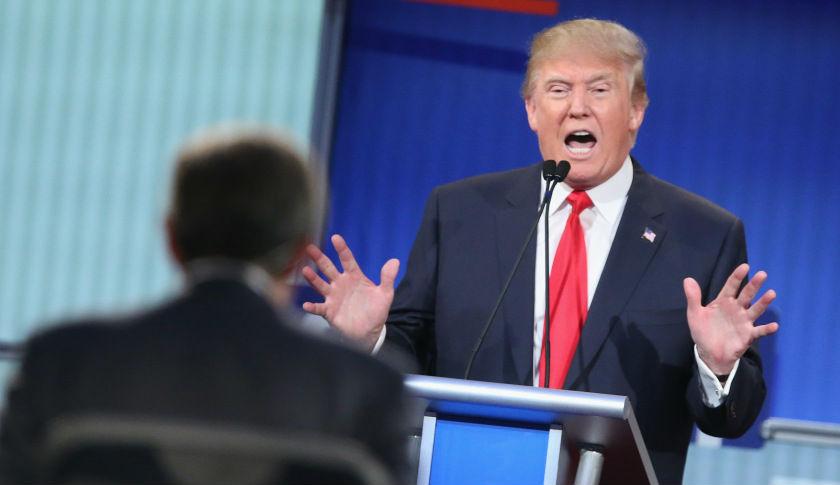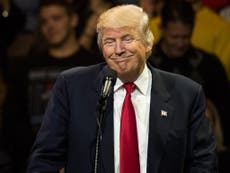Donald Trump has gone to war with the media – and nothing is going to stop him
The media are feeling jittery – they’ve never faced a president who so instinctively understands them, and how to manipulate them


Last week, Donald Trump was supposed to have held his first proper press conference in five months. But then the event was put off; his aides now talk vaguely about holding it early in the New Year. It being merely a case of battle deferred, not battle avoided.
If one theme of the next four years already seems set, it is that of conflict between the 45th president and the media – yes the hoary old mainstream media, fighting off countless new challengers to be sure, but which still sets America’s real news agenda.
The sheer novelty of the situation will make the conflict more intense. Trump is a President-elect who has defied every standard rule of politics, who said and did things that would have destroyed any normal candidate, but not him. He gives every sign of continuing that way in the Oval Office.
Ditto his attitude to the media. On the campaign trail he constantly trashed them, referring to them in terms like “scum” and “scavengers” at the mass rallies that were his favoured electoral events. News organisations whose coverage offended his fragile sensibilities abruptly lost their credentials, or were threatened by lawsuits.
And that’s only one reason the media are feeling jittery. Another is that they’ve never faced a president who so instinctively understands them, and how to manipulate them. Every now and them he abruptly makes nice with the “scum” and “scavengers” – as well he might, having secured $2bn worth of free press coverage during the primaries, according to a study by the New York Times.
He realises the price papers and TV will pay for access. During the campaign, it emerged this week, he struck a deal with Sinclair Broadcasting, a group that owns or co-owns 173 TV stations across the country, offering exclusive interviews in return for unfiltered coverage. What’s do stop him doing the same, or more, from the Oval Office?
Most fundamental of all in the battle that looms is the struggle between fact and fiction. Trump has reality TV in his blood. As a candidate he thrived by projecting his own reality, often in brazen contradiction with the facts, and got away with it. Liar, Liar, screamed the fact-checkers marshalled by the mainstream media, but voters didn’t care.
Some had expected Trump to become restrained, more “normal”, once he was President-elect, and the colossal responsibilities and historical weight of the job ahead started to sink in. Not a bit of it, however. Perhaps it was naïve to expect a man of 70 (Trump will be the oldest ever president to take office) to change his ways. But he continues to operate as he did as candidate.
Less than a month before his inauguration, he’s still trashing the media. He’s still peddling lies (“I would have won the popular vote but for millions of illegal votes”) and still bearing grudges. He still seeks to bypass the traditional media via Twitter and mega-rallies of the faithful, as in his recent “thank you” tour.
What he won’t do, as the cancelled press conference shows, is meet them in a proper press conference. None of those impromptu calls to friendly outlets like Fox News make up for the fact that he hasn’t actually met the assembled press since July (when he urged Russian hackers to root out those missing Clinton emails – only a joke, he said later).
When he finally does take the plunge, the potential flash points abound. There’s the conflict of interest question, between Trump’s business interests and those of the US he is about to lead. That issue was supposed to have been addressed at last week’s cancelled press conference. Others range from Russian hacking, the fate of Obamacare, Trump’s tax plans, his attitude to Nato and the Middle East, none of them compressible into 140 characters.
And there’s the more parochial matter of how the White House press itself will be treated. Trump’s behaviour as President-elect suggests he could do away with the tradition whereby a small pool of correspondents follows a president everywhere he goes, even to church.
Reince Priebus, soon to become Trump’s chief of staff, has hinted the current practice of daily public briefings may be dropped. It has been suggested too that the White House, and not the White House Correspondents’ Association, will decide who sits where in the White House press room.
None of this of course matters to most Americans. And why should it? Conflict between the media and the White House is nothing new. Bill Clinton could erupt volcanically against the media, and unflappable Barack Obama was in fact the most aggressive pursuer of leaks to the press of any president in history. And then of course there was Richard Nixon, who hated the press and was ultimately in part brought down by it.
But Trump, as always, is different. Never has a president enlisted someone like Steve Bannon, former head of a propagandistic far-right news service, as his top White House adviser. Once again the fact-driven world and the “post-truth” world are about to collide.
What’s also different is a sense that America’s constitutional checks and balances no longer work as they used to. The country’s centres of power – the White House, Capitol Hill, and soon, in effect, the Supreme Court – are in the hands of the Republican party of which Trump has staged his hostile takeover.
Some of those checks and balances are explicitly laid out in the US Constitution. Others are not. One of the latter is a strong press, as the saying goes, to keep the bastards honest. The concern is as old as the Republic. “Were it left to me to decide whether we should have a government without newspapers, or newspapers without a government,” said Thomas Jefferson, “I should not hesitate a moment to prefer the latter.”


Join our commenting forum
Join thought-provoking conversations, follow other Independent readers and see their replies